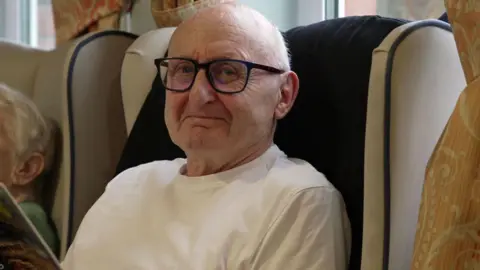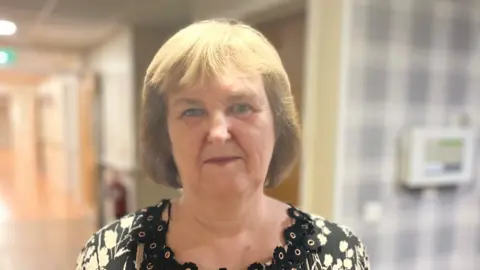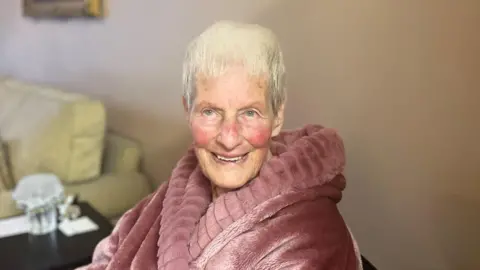'I cannot go home until a care plan is in place'
 BBC
BBCA nursing home manager has said she is "frustrated" with the lack of progress by the Department of Health in reforming Northern Ireland's social care system.
Linda Graham, who is regional manager of nine nursing homes, said the system required consistency and joined-up thinking.
"We want to nurse our residents in the nursing home and not in an emergency department or in the back of an ambulance," she said.
The Department of Health said its three-year plan includes investment in alternatives to emergency departments for some of the most vulnerable citizens.
The long waits at emergency departments have been well documented and one of the issues that keeps being brought up is the lack of bed space.
Patients may be well enough to leave but they cannot be discharged because there is no care package in place at home or they need to go into a nursing or residential home for either a short or long-term stay.
That is what is known as social care.
Unlike the rest of the UK, health and social care are integrated in Northern Ireland but staff in both hospitals and the community say there is little evidence that the two are actually working together.

Ms Graham said people in her sector have told the Department of Health what was needed but "still aren't getting results".
She said nursing homes should be able to phone the hospital directly, cutting out the GP, in order to access advice, and where appropriate hospital teams could come out to treat residents in the nursing home.
Michael Stevenson, 80, is staying temporarily in a nursing home in Belfast while attempts are made to find him a carers package and adjustments made to this home.
The cost of a nursing home place is almost triple that of similar care in the community.
He said he wants to be cared for in his own home and not in a nursing home.
"I feel I don't belong here, I am not that bad," he said.
"There is nothing really wrong with me. Yes, I need support but that shouldn't mean I have to stay in a nursing home."

Dr Darshan Kumar, who is the clinical director in acute medicine at the Northern Health Trust, said there was a disjointed approach to keeping older people out of hospital.
The other trusts operate a hospital at home scheme - whereby consultants and physiotherapists would go out and visit patients - but the Northern Trust operates a direct assessment unit instead.
This allows GPs to speak directly to a consultant who can advise on diagnosis and treatment instead of a patient being brought to the emergency department.
Dr Kumar said an agreement on what model provides the most benefits and best outcomes for patients would save "time, effort and money".
Senior health trust sources have told BBC News NI they can no longer wait for change to come from the Department of Health and instead are going it alone.
They say it is not about more money but how current funding is spent.
There are several initiatives that can keep older people at home and out of hospital but they are not part of a specific, overarching strategy with ministerial direction.
They are often pilot schemes and the funding eventually runs out.

Betty McKenzie, 88, is receiving hospital care at her home in Comber, County Down, provided by the South Eastern Health Trust.
She has a pacemaker to regulate her heart rate and is recovering from a broken femur after falling in the Ulster Hospital.
A multi-disciplinary team delivers her care package, which includes two nurses attending daily, a consultant geriatrician and a physiotherapist.
Betty also has a carers package, which means four visits a day and all of this is paid for by the health service.
"The hospital has come to me," she said.
"It's a brilliant service and keeps me out of hospital, which is good as they are short staffed, and you can't sleep with the bright lights and it is so noisy."
Hospital at home 'offsets huge costs'
There are 15 patients in the scheme, which is currently operating in North Down and Newtownards, and it is hoped that will increase to 40 by April when it can be extended to Lisburn and Down.
The trust also hopes to extend it to 60 people by September, but without a strategy and dedicated funding the scheme could collapse.
Dr Amanda Crawford, one of the consultants making these home visits, said staff were passionate about not only expanding the hospital at home service but making it equitable across the entire trust.
"Looking after people in hospital - the care, the beds, food - it all accumulates and is expensive," she said.
"With hospital at home we have proven it offsets those huge costs. It's just about doing things differently."
The Department of Health said its three-year plan included implementing new models for delivering home care services.
"Expanding and improving social care will require systemic reform, investment in the workforce and greater collaboration across primary, secondary and community delivery," they said.
